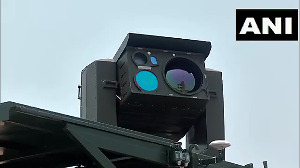Videsh Sanchar Nigam Ltd, or VSNL, has been on a roller coaster ride ever since it was acquired by the Tata Group on February 2, 2003.
The Indian international telecom carrier had $1.5 billion revenues in the 2000-01 fiscal year; it had a virtual monopoly in calls carried out of and into the country; and it looked well set to reap rewards as the fourth largest Asian economy increasingly plugged into the world and the local telecom industry boomed.
The ink had barely dried on the $290-million cheque group chairman Ratan Tata handed over to then disinvestment minister Arun Shourie, when VSNL's troubles started. (The Tatas paid another $237 million for shares it acquired in an open offer completed that May.)
Competitors started nibbling at VSNL's heels offering domestic Indian telecom companies better rates to carry international calls; dominant fixed-line player Bharat Sanchar Nigam Ltd, slowly started pulling out from a 'preferred carrier' arrangement it had with VSNL; and the new entrant to the Tata fold ran foul of the telecom ministry on investment decisions. The VSNL buy was widely seen a lemon.
In the 42 months since then, the VSNL team has worked hard: it has made two bold acquisitions taking advantage of firesale prices of global telecom assets. Just this June, it completed a $130-million acquisition of Tyco Global Network, an undersea cable network touching North America, Europe and Asia.
And, last fortnight it announced it was buying Teleglobe International Holdings Ltd., a bulk voice and data service provider, for $239 million. The acquisitions are expected to help VSNL turn around to become a player with global scale.
Has VSNL reversed its slide? The acquisitions hold promise for VSNL. It gives it global scale in what is a cut-throat commodity business ruled by a single variable: price. Analysts rate Tyco Global's 56,480 kilometer-long network among the youngest and best in the world for data and voice services.
Teleglobe piggybacks on such networks; it brings customers who use leased capacity to complete their calls. The Hamilton, Bermuda-headquartered company has 1,400 global customers and carried 13 billion voice minutes on its network compared with the 240 relationships and 3 billion minutes volumes of VSNL.
"Teleglobe gives VSNL global reach and a large wholesale client base," says Jason Kowal, the executive vice president of PriMetrica, Inc. that owns New York-based telecom consultant TeleGeography Research.
From an India-centric company with small rights on global networks, today VSNL has transformed into the world's fifth-ranked voice carrier with excellent assets in the US and Europe.
Financial numbers also stack up fine for VSNL. Teleglobe had revenues of about $1.1 billion in calendar 2004, though it posted a net loss being restructured under its private equity owner Cerberus. Without a debt overhang, gross profits-- at 2 cents a minute--of about $260 million are there to be made.
Further, says Srinivasa Rao Addepalli, head of corporate strategy at VSNL, "Teleglobe's [network rental lease] costs will be Tyco Global's revenues."
The Tyco Global and Teleglobe acquisitions are expected to nearly triple VSNL revenues to about $2 billion and the impact on earnings per share is seen neutral or mildly accretive in the year to March 2007. In comparison, VSNL's revenues are still about half its 2000-01 numbers: it had a $174 million profit in the year to March 31 on $784 million sales.
From a capital costs perspective, the Tyco Global and Teleglobe purchases have been concluded at incredible prices. About $2.5 billion, mostly funded by debt, is estimated to have been spent building capacity on the Tyco Global network to meet demand projected under the dot-com high.
Similarly, Teleglobe spent about $7 billion though not all its assets have were sold by private equity firm Cerberus, the company's last owner. In effect, VSNL has got the assets at less than $370 million.
Yet, VSNL has several challenges ahead, primary among which is an inexperienced top management-- ironic for a 135-year-old company. Despite focusing on telecom as a core area to grow in, the Tata group has remained a laggard in the industry domestically.
"They haven't been able to manage competition in India; how will they operate in markets (US, Europe) that are far more competitive and where customers are savvier,"asks an Indian telecom veteran, requesting anonymity.
The risk will get bigger as VSNL moves into the lucrative market of servicing enterprise services, a logical progression it will be tempted to make. The rollercoaster ride is just beginning for the global carrier from Prabhadevi in Mumbai.








 © 2025
© 2025